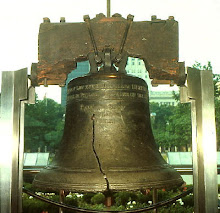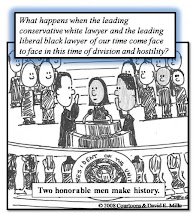
Here is a piece from BLT, one of the best legal blogs in the nation which we look to each day for commentary and ideas. This is a piece by Tony Mauro who has had a chance to review the complicated case of Pleasant Grove, relating to monuments on public land. Can't blog on everything, so in this case we will rely on his thoughtful words.
'Last year Chief Justice John Roberts Jr. won praise for quoting Bob Dylan in an opinion (a dissent, actually, in Spring Communications Co. v. APCC Services.) Not to be outdone, apparently, Justice Samuel Alito Jr. today quoted at length from John Lennon.
It came in Alito's major ruling in Pleasant Grove City, Utah v. Summum, which redefined monuments placed on public land -- such as a Ten Commandments monument -- as a form of government speech, rather than private speech that can run afoul of the First Amendment's Establishment Clause. Some briefs had argued that if a memorial was to be regarded as a message conveyed by government, the government ought to be forced to embrace the message through a formal resolution.
In knocking down that argument, Alito, 58, makes the point that public monuments can convey multiple messages, or messages that change over time. The Statue of Liberty, for example, came to New York as a symbol of friendship between France and the United States, Alito said, and only later became viewed as a beacon welcoming immigrants.
Similarly -- and here's where Lennon comes in -- the mosaic in Central Park in New York City that displays the word "Imagine" as part of the memorial to John Lennon conveys several messages. "Some observers may 'imagine' the musical contributions that John Lennon would have made if he had not been killed," Alito said, while others might think of Lennon's song by that name, which imagined "a world without religion, countries, possessions, greed or hunger."
Alito then drops a footnote that offers the full text of Lennon's lyrics to the song "Imagine." The Court's newest justice also makes a number of other Central Park references, including the 1876 controversy over a memorial to Daniel Webster, and a monument to Balto, the sled dog that brought medicine to Alaska during a diptheria epidemic.
If these references have a distinctive New York City flavor, it's no accident. Most of them were mentioned in a brief filed in the case by Michael Cardozo, corporation counsel for the city of New York on behalf of the city, arguing for the government speech approach that Alito adopted.
http://legaltimes.typepad.com/
So was Alioto plagiarizing Cardozo? Does Cardozo care? He won!
































No comments:
Post a Comment